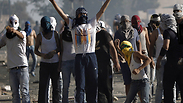
Riots in Shuafat. 'The lessons have been learned'
צילום: AFP
History unlikely to repeat itself
Analysis: Even if Israel launches wide-scale operation in Gaza, it will be a military conflict between State of Israel and state of Gaza, rather than an intifada involving Palestinians in West Bank and Israel's Arabs.
The events of the past few days have created many statements about the eruption of a third intifada. Indeed, today's circumstances are reminiscent of those of October 2000.
In both cases there were Israeli-Palestinian negotiations which ended in a deadlock; in both cases, one event which took place in Jerusalem sparked the fire; in both cases, one arena inflamed the other ones; and in both cases, Israel's Arabs engaged in extremely violent riots.
And yet it seems that history will not repeat itself, both because there is a fundamental difference in several aspects and because lessons have been learned.
The first lesson, which has been learned by the police, is to deploy massive forces within a short period of time at any center of confrontation. A massive force creates deterrence, but more importantly, it makes it possible to deal with the riots without requiring the use of live ammunition.
The Israeli Arabs' leadership has also learned its lesson from those events, at least partially. Restraining statements like the ones made by the Qalansawe mayor and others were not heard in October 2000. The level-headed leaders of Israel's Arab citizens realize that every round of violence sends any attempt to improve the Arab's rights backwards.
A third lesson that has been learned, a bit late but it seems that the penny has finally dropped, has to do with the need for enforcement against "price tag" activities. If the murder of the Shuafat youth has indeed been solved, it reflects the required resolve when Arabs are targeted too.
The fourth and final lesson, on the tactical level, has to do with the blessed speed in which the IDF began easing restrictions in the Hebron area the moment after the bodies of the three teens were found.
The defense establishment appears to be creating a proper separation between the ongoing effort to capture the murderers and curb Hamas, and the recognition that pressuring the Palestinian population in Judea and Samaria must only be the result of an operational need and not a collective punishment measure.
Two additional differences between now and then have to do with the political aspect. The first is that Yasser Arafat encouraged the violence in 2000, while Mahmoud Abbas renounces it. The second is that Gaza and the West Bank are in practice not one political entity.
Both the leaders of the Palestinian Authority and the majority of the West Bank population have no interest in launching a third intifada right now. Hamas in Gaza is more isolated, and as things calm down in Judea and Samaria, in Jerusalem and across Israel, its incentive to continue the rocket fire will decrease.
But even if the rocket fire continues, and even if Israel decides on a wide-scale operation in Gaza like Operation Cast Lead, it will be a military conflict between the State of Israel and the state of Gaza, rather than an intifada which will include both the Palestinians in the West Bank and Israel's Arabs.
Gaza is an independent state for all intents and purposes, and we must understand the advantage stemming from this situation. If we treat Hamas solely as a terror organization, in any event of a military conflict we will only be able to attack clear terror targets, like rocket launchers. It's hard to achieve deterrence if the fighting is restricted to this type of conflict.
If Gaza is a state which chose to attack Israel, there is a possibility and justification, in terms of international law as well, to attack "national infrastructure" targets. This is the only type of offensive that could create effective deterrence within a short period of time.
Such an operation against Gaza will take place, if not today then in a few months from now. It's important for it to be prepared militarily and explained diplomatically as a move of one state against a neighboring state it is being attacked by.
The relative success in maintaining the deterrence against Lebanon stems from the understanding of the country's forces that "the third Lebanon war" will deal a difficult blow to the Lebanese state and its infrastructure, and Hezbollah is not interested in that.
Hamas operates according to the same logic – the logic of a terror organization, but one which also has responsibility towards a state.










